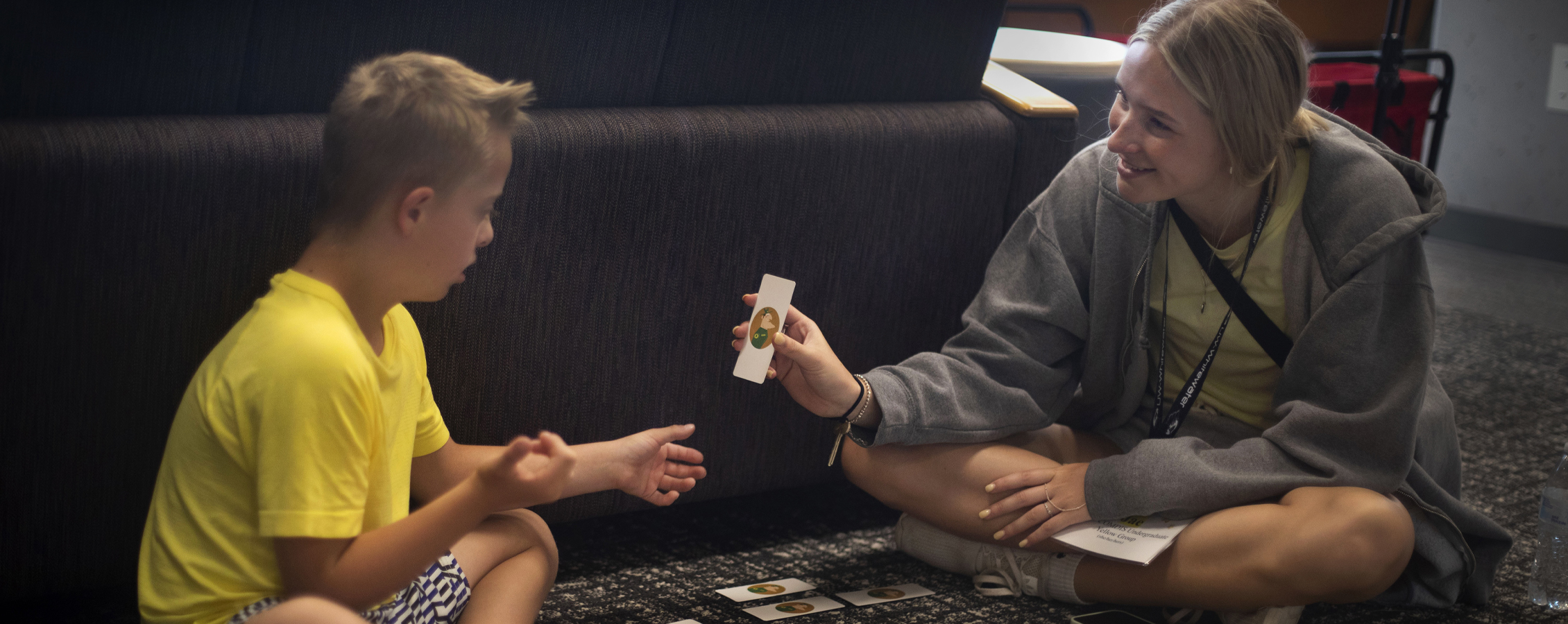CLINIC SERVICES
If you would like to inquire about speech-language therapy services with UW-Whitewater's Department of Communication Sciences and Disorders clinic, please fill out our application for services. After your submission, please give two weeks for notification via email for availability/appointments or if you have been put on our waitlist.
Graduate students have the opportunity to work with clients across the lifespan and with a variety of communicative disorders in the UW-Whitewater Center for Communicative Disorders (UWW-CCD). Located in the Roseman building in the middle of the UW-Whitewater campus, the UWW-CCD provides services to members of the community, faculty/staff, the UW-Whitewater Children’s Center, and students on campus. Besides the UWW-CCD, there are numerous opportunities for students to meet career interests and certification requirements in rural and urban off-campus practicum sites. These include various hospital, rehabilitation, acute care, and nursing home environments. Additionally, we partner with numerous Birth-3, PreK-12 placements, and specialty pediatric sites.
The UWW Center for Communicative Disorders supports equitable treatment of clients. No individual shall be discriminated against based upon race or ethnicity, religion, age, gender, disability, sexual orientation, or any other characteristic protected by federal or state law. We provide all services in a manner consistent with the American Speech Language and Hearing Association (ASHA) Code of Ethics.
The clinic treatment programs start at the beginning of the fall and spring semesters; however, referrals are accepted throughout the year. Most sessions are scheduled one to two times per week, 8:00 AM to 4:30 PM, Monday through Friday. Scheduling is dependent on clinical training needs, course schedule, and hours of availability. The UWW-CCD maintains a schedule consistent with the university calendar. At this time, we do not offer services during the summer.
To request more information about our services, please contact the UWW Center for Communicative Disorders at (262) 472-1464.
Aphasia is a disorder that results from damage to language centers of the brain. As a result, individuals who were previously able to communicate through speaking, listening, reading, and writing become limited in their ability to do so. The most common cause of aphasia is stroke, but traumatic brain injury, brain tumor, and other sources of brain damage can also cause aphasia.
Research has proven that although much recovery happens immediately following a stroke, many people with aphasia continue to improve over a period of years and even decades. The focus of the aphasia clinic is to provide meaningful opportunities for socialization and functional use of compensatory communication strategies for generalization into activities of daily living.
Education and Training
Individual and group treatment sessions are scheduled throughout the academic year (fall and spring semesters). The group treatment model at the University of Wisconsin-Whitewater Center for Communicative Disorders (UWW-CCD) embraces a positive quality of life and promotes opportunities for social interaction. Our graduate students have been instrumental in contributing to significant changes in the ability of group members to communicate and to develop, regain, and enhance social relationships, and improve quality of life. Graduate students provide individualized therapy services addressing expressive and receptive language skills, written language, reading, and speech and are supervised on-site by a licensed speech-language pathologist.
Aphasia Clinic is scheduled on Mondays but additional treatment sessions are offered throughout the week.
For more information on our Aphasia Clinic please call us at 262-472-1464 or e-mail us at comdis@uww.edu.
Diagnostic Services: Clients enrolled in the Center for Communicative Disorders (CCD) are eligible to receive a comprehensive assessment of their oral and written communication skills (i.e., speech, language, literacy, etc.) as part of their semester’s programming. The results of an assessment are used to determine a client’s profile of strengths and challenges and utilized as one source of information to drive intervention programming.
Individual & Small Group Therapy Sessions: Individual and small group speech, language, and literacy therapy sessions are scheduled for pediatric clients, ranging in age from approximately 18 months to approximately 18 years of age. Intervention can address: speech sound disorders (articulation), phonology, oral and written language, fluency, social skills, executive functioning, and augmentative and alternative communication (AAC). In addition, the clinic can provide preventative and/or strategy based intervention for children and adolescents who are at risk of developing, or already have, academic difficulties in relation to their communication deficits.
Hearing Screenings: Graduate students from the University of Wisconsin Whitewater’s Center for Communicative Disorders conduct hearing screenings for children enrolled in public and private schools throughout southeastern Wisconsin, in collaboration with school professionals.
Education and Training
Individual and group treatment sessions are scheduled throughout the academic year (fall and spring semesters). Graduate students provide individualized therapy services and are supervised on-site by a licensed speech-language pathologist.
The Pediatric Speech and Language Clinic is scheduled throughout the week and is based on client/clinician/supervisor/room schedules.
For more information call us at 262-472-1464 or e-mail us at comdis@uww.edu.
The way a person sounds can play an important role in how they express themselves. Voice/communication training can be helpful when aspects of a person's voice and/or the way they speak do not match their gender identity or gender expression. Individuals seeking gender-affirming voice services or voice affirming services include those who identify as transgender, gender fluid, gender non-binary, gender diverse, gender nonconforming, or other gender identities. We engage in shared goal setting for individuals to safely and effectively use voice/communication aspects that align with their identity.
Education and Training
Graduate students provide individual sessions (scheduled throughout the academic year - fall and spring semesters) to individuals seeking assistance with voice. Individualized therapy services focus on pitch, intonation, resonance, rhythm, rate, volume, language, and nonverbal communication. Graduate students are supervised on-site by a licensed speech-language pathologist.
For more information call us at 262-472-1464 or e-mail us at comdis@uww.edu.
Clinic Director: Kaia Feggestad M.S., CCC-SLP
feggestk@uww.edu | 262-472-1464

